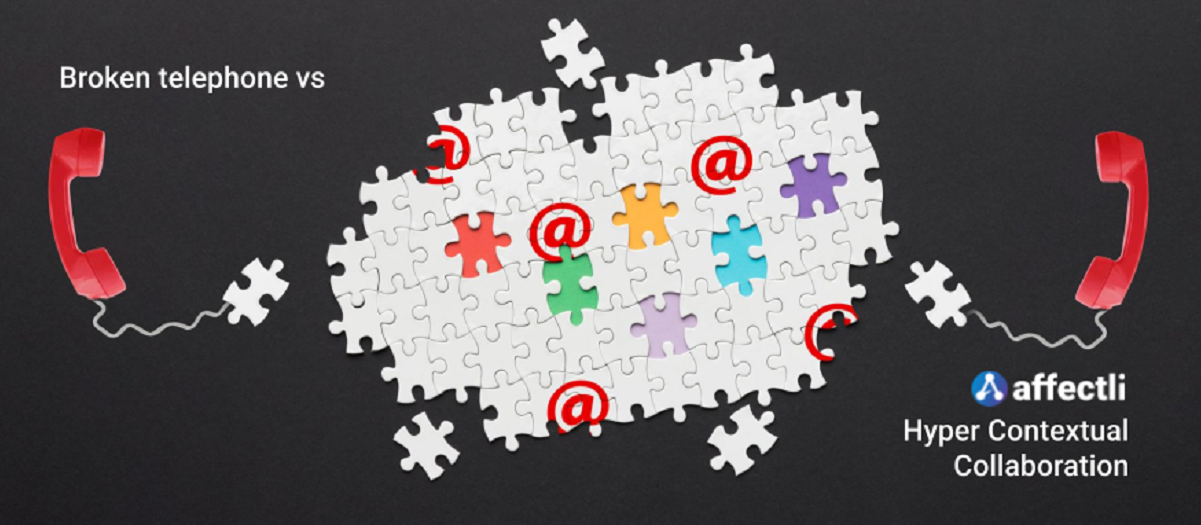As kids growing up, we all played that game: broken telephone…
The more people in the “telephone” chain, the more context and information is lost, and the further disconnected we get from the original message. With each person in the link, it is inevitable that information is added, critical information is omitted, and somehow, the end result is vastly different from where it all started.
People focus on communication, communication tools, communication styles, but not enough emphasis is placed on the criticality of contextual communication in order to better – and more effectively – collaborate on tasks, projects and the like.
It’s expected. It’s preached. Tools are provided. And in essence, they are vital components that determine an organisation’s ultimate success (or failure)… but the question begs: Are organisations doing everything they can to achieve what we refer to as Hyper Contextual Collaboration?
Most organisations rely on email as their main form of communication. I have made no secret of the fact that I detest email and elaborate more on this in a recent blog titled: Ridding the world of email. Besides the fact that it’s so time consuming, more often than not, it is missing key information and does not include the right people.
Experts will tell you that the hardest part of communicating effectively, is in knowing how to contextualise the content. Contextual Communication provides the recipient with specific information so that assumptions are not drawn, as well as places meaning into the message. More importantly, it provides a platform for a true dialogue to take place.
Organisations with a strong customer centricity focus are doing well when it comes to providing context when dealing with their customers. However, are they applying the same focus on their most valuable assets, their staff and key stakeholders? Are they doing enough to help make their people as efficient as possible, and in turn, maximising their ROI?
Equally important is the need to provide Contextual Collaboration tools to ensure that groups of people are moving in unison and in sync towards a collective goal. But what happens when a critical area of the business requires attention or an urgent action? How many channels do employees have to navigate through to ensure they get access to all the relevant information and notify the right people timeously?

Data security then also becomes a major issue, and factors to consider include:
What if someone drops the ball and forgets to relay an important piece of information?
Or when someone leaves an organisation – albeit suddenly or even foreseen?
What happens when someone new steps in and is required to pick up where their predecessor left off?
Assuming information hasn’t been lost, misplaced, archived or deleted in its entirety, how long does it take to provide factual, contextual information to sufficiently equip that individual with everything they need in order to carry out the task at hand?
How many people have to stop what they’re doing, and lose momentum while they get the new kid on the block up to speed?
Besides the potential cost implications of a project setback, what are the cost implications to an organisation to get back on track?
Communication and collaboration has turned strategic because at the core of it, data is currency, time is money, and in some instances, could even be a matter of life and death. If organisations were sufficiently equipped with tools that bring their People, Processes and Systems closer together to realise their Optimal Performance Zone, what would it mean to their bottom line?! It’s simple: It would result in a more connected, effective and accountable workforce that would ultimately deliver an increased ROI!


Have you considered how much inefficiency there is in your organisation, and what it would mean to your bottom line if the issue of Hyper Contextual Collaboration was addressed?
Here’s some more food for thought:
- 86% of employees and executives cite a lack of collaboration or ineffective communication for workplace failures. (Source: Salesforce)
- 97% of employees and executives believe that a lack of alignment within a team impacts the outcome of a task or project. (Source: McKinsey)
- Knowledge workers spend an average of 14% of their time communicating and collaborating internally. Studies show that internal collaboration through social tools could help increase productivity by as much as 20 to 25%. (Source: McKinsey)
- The average worker spends an estimated 28% of their time managing (internal) email and an additional 20% of their time looking for internal information, or tracking down colleagues that can assist with specific tasks. However, when the appropriate social media tools are adopted, this can reduce the time by as much as 35%, with additional value being realised through a faster, more efficient, and more collaborative approach. (Source: McKinsey)
It’s with these very basic principles in mind that we have spent the past 15 years building and developing AFFECTLI into a product that brings Contextual Communication and Contextual Collaboration together to provide an organisation with Hyper Contextual Collaboration tools.
Gone are the days of the broken telephone; he-said-she-said; misplaced or omitted information, documents and the like… We have worked tirelessly and systematically to deliver a tool that ensures that the right people get the right information at the right time – every time – with our fully auditable Hyper Contextual Collaboration (HCC) platform that drives accountability, and increases the Optimal Performance Zone (OPZ) of any organisation, resulting in a sustainable business with a competitive edge.
If you are interested in improving the effectiveness of your organisation’s HCC and OPZ through the adoption of our proven toolkit, AFFECTLI, please feel free to reach out to us for a demo on get in touch.
